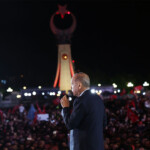“Thanks to Congressional insistence – especially that of Senator Menendez – the administration is going to have to demonstrate that Turkey will be held accountable if it imperils the US priority of ‘stability in the Aegean’.”
“Is Turkey fundamentally reassessing its pro-Western foreign policy?” Fareed Zakaria’s question to Joe Biden’s National Security Adviser Jake Sullivan on June 4 made me turn up the TV volume.
Sullivan’s answer was fascinating:
“The picture is more complicated than this idea that Turkey has moved into some other column. They’re charting an independent foreign policy but one in which we can have a constructive relationship with them even in the defense space, where President Erdogan’s major request to President Biden is for the US to provide F-16 planes which President Biden has said he would like to do.”
And once again, F-16 sales to Turkey became a top-of-the-agenda item ahead of the NATO summit in Vilnius. Since this topic seems to capture more than its fair share of attention, let’s review what we know post-Vilnius:
The goal of securing Sweden’s NATO membership by Vilnius was thwarted by Turkey. The call between Presidents Biden and Erdoğan the Sunday before the summit was a key moment. Since they were scheduled to meet three days later, such a call was most likely scheduled to “seal the deal” and let President Biden claim the credit for securing Sweden’s accession.
Instead, Erdoğan restated his intransigence and even added a new ask: US help with EU accession talks for Turkey. It is one of Washington, DC’s open secrets that this call did not go well and that President Biden was not happy.
Interestingly, the lead article on the news site Axios the next morning focused on President Biden’s “quick-trigger temper.” It claimed that this temper leaves some aides to try to avoid meeting with him alone and that he has exploded at staffers with “God dammit, how the f**k don’t you know this?!” and “Don’t f**king bullsh*t me!” We can only imagine with amusement who was the target of this temper after the call with Erdoğan.
The president’s unhappiness must have been relayed in no uncertain terms to Erdoğan, who declared his support for Sweden’s accession without any new up-front concessions the very next day.
Howard Eissenstat, a Turkey expert at St Lawrence University and the Middle East Institute, has pointed out that Erdoğan is a master at “noisy diplomacy – lots of flash for the headlines, very little substantive effect.”
Thus, nearly two weeks after Vilnius and after countless headlines declaring “deals” and discussing details of alleged deals, Sweden is still not a member of NATO and the administration has not secured the clearance of congressional holds for an F-16 sale to Turkey.
And it is important to be clear here, it is not only Senator Bob Menendez that is maintaining a hold. With Erdoğan disingenuously claiming that he has to wait until October for the Turkish Parliament to reconvene, the drama over Sweden’s membership and what Turkey is demanding in return looks to continue into the fall.
Conventional “popular” wisdom in Greco-Turkish relations holds that any benefit for one takes place only to the detriment of the other. Thus, while the hand-wringing over speculation that Greece somehow lost at Vilnius is to some extent understandable, it is also wrong.
As discussed above, there is no deal yet and there may be no deal until the fall. The ultimate goal of the policy debate over F-16s to Turkey was not about punishing Ankara, but to force a change of policy.
By every indication, policy is changing. Coming out of Vilnius, the Biden administration has joined Congress in elevating de-escalation between Turkey and Greece to a policy priority equal – if not greater – in importance as expanding the NATO Alliance.
In multiple White House read-outs leading up to Vilnius (most notably after calls between President Biden and Prime Minister Kyriakos Mitsotakis and President Erdoğan, and a call between Jake Sullivan and Erdoğan’s spokesman) the Biden administration described “maintaining stability in the Aegean” as “important” and as a “shared priority.” The State Department has worked overtime to communicate to both Congress and the Greek-American diaspora that it cares about the Aegean.
The administration belatedly realized that it has to provide more than words on this front. But as the saying goes, better late than never. A change of policy is coming.
Thanks to Congressional insistence – especially that of Senator Menendez – the administration is going to have to demonstrate that Turkey will be held accountable if it imperils the US priority of “stability in the Aegean.”
Just as was the case with the F-35s to Turkey, a suspension or cancellation of any weapons deal is going to be synonymous with “accountability.” Erdoğan seems to have realized this, declaring that there are no plans to use Turkish F-16s against Greece.
But as American author Robert Heinlein argued: “Never appeal to a man’s better nature. He may not have one. Invoking his self-interest gives you more leverage.”
The second part of a change of policy is upping Greece’s deterrent factor. Decades ago, we had the 7:10 ratio in US military aid to Greece and Turkey. Today, we are on the verge of the US advancing a qualitative military edge for Greece. With F-35s, Rafales, and its own upgraded F-16 fleet, Athens will not have to rely on “promises,” delayed accountability, or worry about who is in the Oval Office at a particular time.
Erdoğan will certainly try to wrestle more concessions out of the Biden administration. There are also American officials who are inexplicably and unjustifiably holding up the formal notification of Greece’s F-35 deal despite congressional sign-off. And the administration seems to be ignoring Turkey’s intransigence on the Cyprus issue – to the point that on the dark anniversary of Turkey’s invasion of Cyprus Secretary Antony Blinken called on EU foreign ministers, with the FM of the Republic of Cyprus in attendance, to support Turkey’s EU accession.
It seems that the Biden administration learns lessons slowly, but American officials will wake up one day and remember that the Republic of Cyprus and Greece have vetoes over any EU-Turkey negotiations.
October is still a long time away, and in the region that invented drama we are certain to have much more of it.
This article was originally published by Ekathimerini.
The views and opinions expressed above are the author’s and do not reflect those of the Free Turkish Press.


